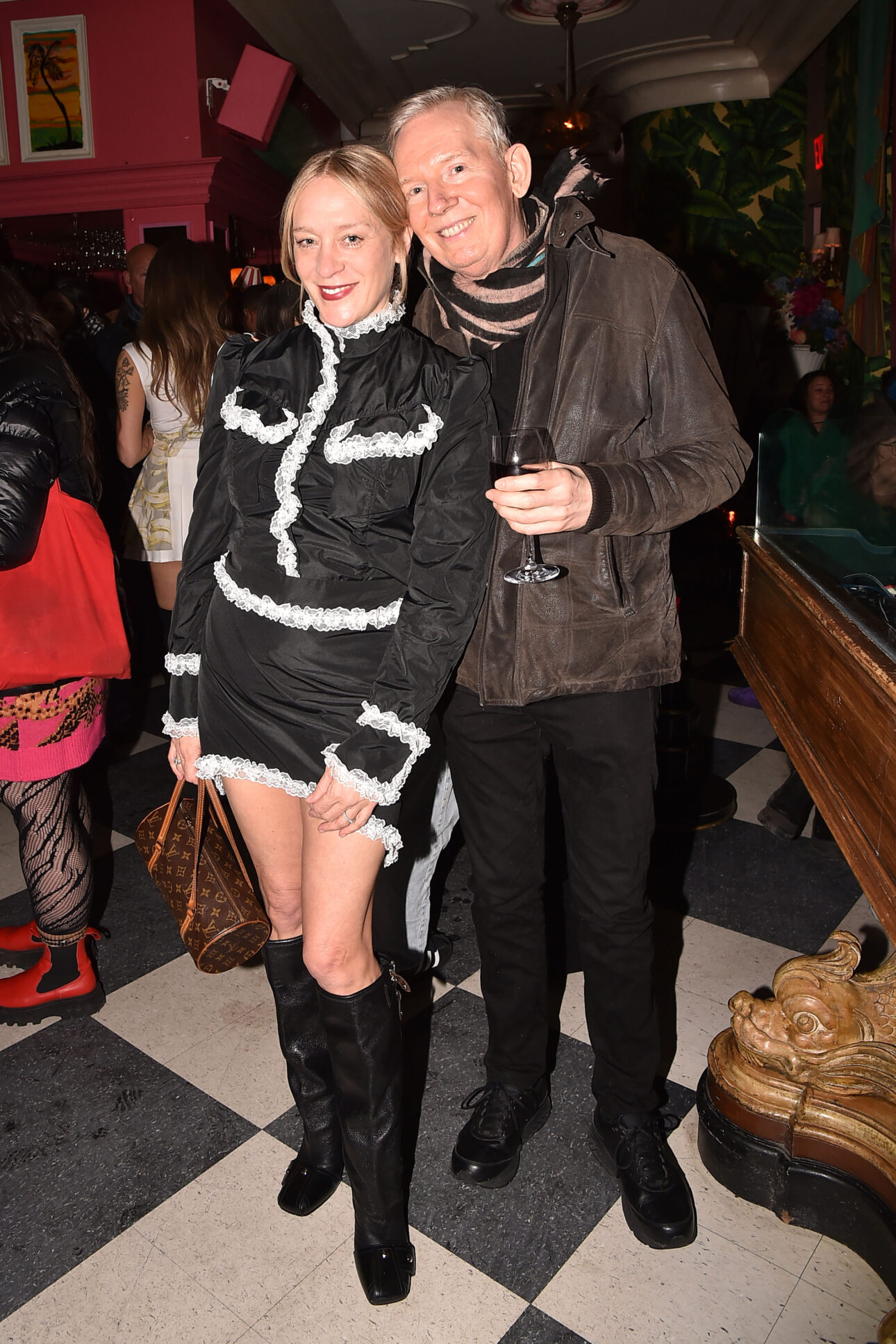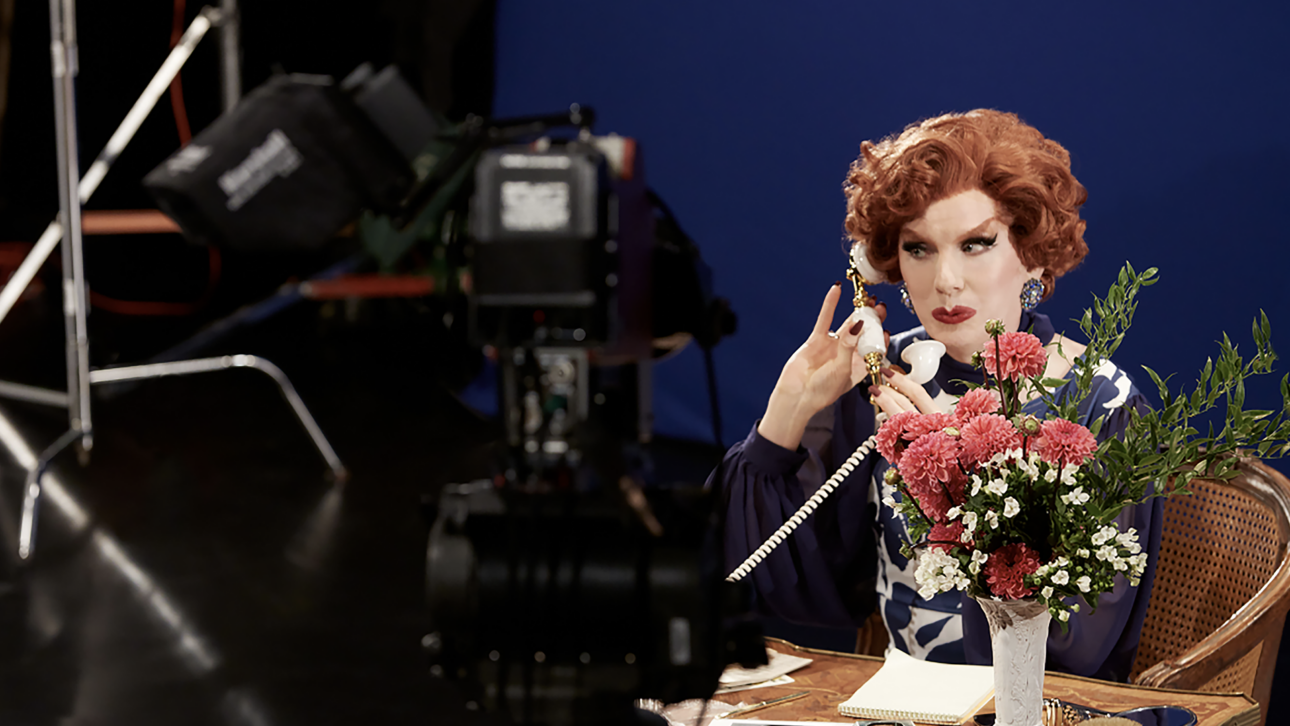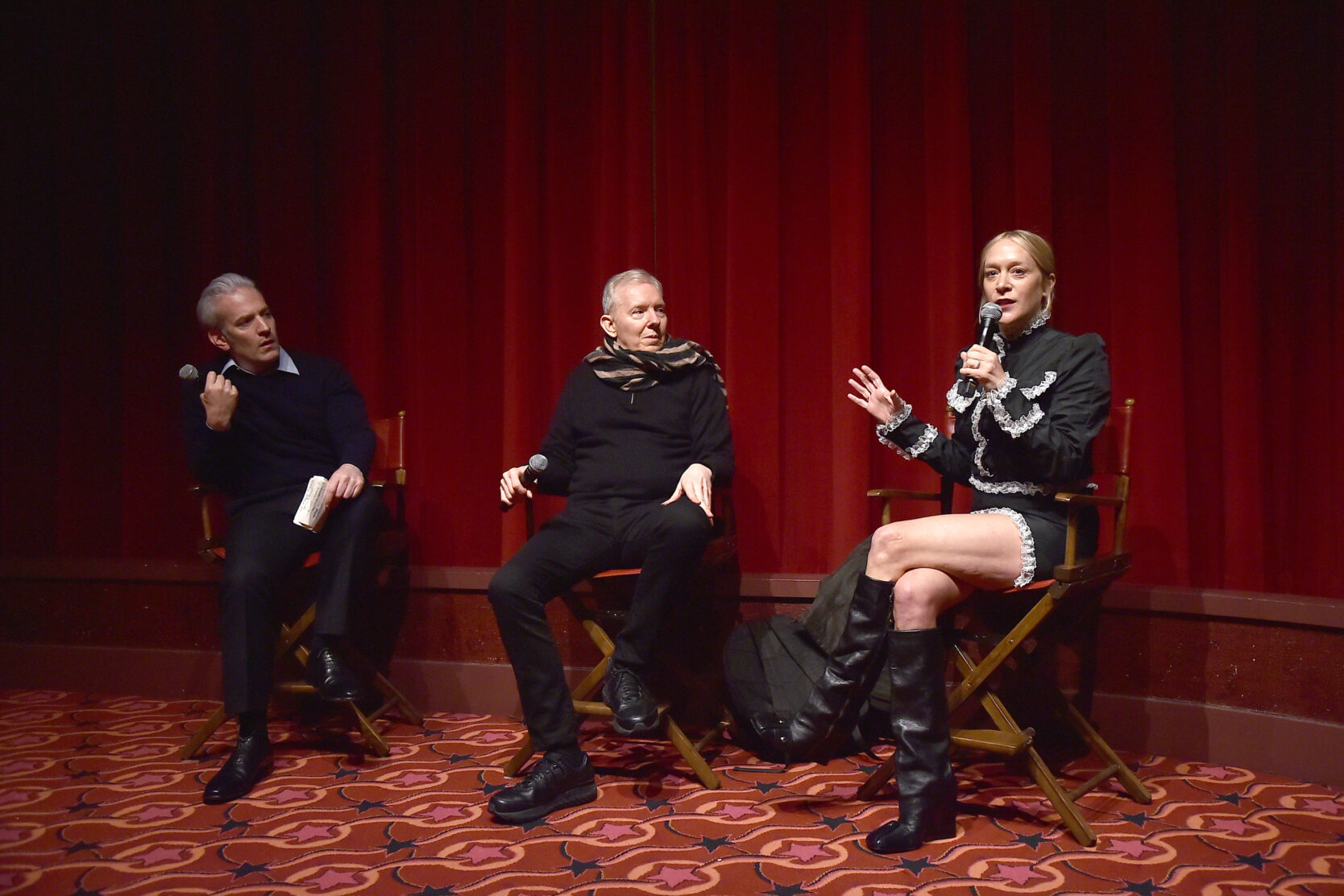“My hotel room phone is ringing. One second,” Chloë Sevigny says, stopping our video call. “Looks like my husband might have sent me flowers. There’s an arrangement coming up.” It’s Valentine’s Day, and she’s in a hotel room talking about one of her latest projects, a short film she directed titled Lypsinka: Toxic Femininity.
A knock at the door, and a vase with gorgeous white flowers is placed on a table. “That’s so beautiful. It’s a shame I have to leave tomorrow.
“Lucky me,” she says.
Sevigny is charmed indeed to have worked on some of the most interesting projects to grace big and small screens—like this, a less-than-an-hour film centering around the downtown New York luminary Lypsinka, a creation of drag artist John Epperson (who’s also a film historian and has lectured about movies for MoMA, the New School, Anthology Film Archives, and the Academy of Motion Picture Arts and Sciences). During the 43-minute short, Lypsinka is in a fever dream, grappling with her essential nature whilst channeling the glamor and camp of Hollywood icons Judy Garland and Joan Crawford.
It’s like nothing you’d ever seen, yet it feels perfectly plausible and, thus, powerful. In fact, the film is a moment to put your phone down, to just let art unfold as Lypsinka “lyp” syncs yet another traumatic existentialist crisis. And thus a juncture to reflect on your own deliriums.
Sevigny, who’s turning 50 this year, is the eternal New Yorker (but rents “a shack,” as she calls it, in Provincetown, Massachusetts in the summer) and forms part of a very specific and marvelous New York creative sensibility and wit that only this city can hold, and that onlookers laud. She’s known for being one of the indie East Village-y cool kids, and we’ve watched her go from model, to actor (Oscar-nominated for Boys Don’t Cry), to fashion icon, to wife and mother, and, once again, film director. (Previous short film directorial credits include 2016’s Kitty, 2017’s Carmen, and 2019’s White Echo.) And even though the world likes to call her an “it girl,” she’s just not limited by that moniker—her abilities and zigzagging, wondrous mind span a sort of infinity, and that’s obvious when spending time with her.
In our conversation, we muse about film, the process of creating art, and how one reaches an audience.
So, Chloë, how did this piece of fascinating art come your way?
Chloë Sevigny: When Scott [Elliott, the producer] approached me about filming this project for them, I went on a YouTube K-hole researching Lypsinka and John Epperson, and was just, like, this is the most elegant creature. His material is often really moving, even in his stand-up. There’s something really feminist about it. And he was just so beautiful, too, in the way that he moved. So we met and embarked on this voyage together. I had previously worked with director Scott in the New Group’s Hazelwood Jr. High and [playwright Joe Orton’s] What the Butler Saw.
What made you feel that you just had to work on this?
John compiled this audio and Scott sent it to me, and I listened to it on headphones while I was walking around and was just, like, crying over the emotion of it. And I thought, “What a great opportunity for Lypsinka to have this very introspective moment and for John to get to act, to really perform, not in a jazz-hands way, but to really dig into some material that was really heavy.” I just want people to watch it, and I want to propel John in some way. Because Lypsinka/John deserves so much more. He should have his own reality show or be a judge on RuPaul’s Drag Race for an episode, or something should happen for him because he has so much to give.
What was the process like for you?
We did it on a super shoestring, the best that we could for the budget we had. And I hate to toot my own horn, but I did come up with some brilliant ideas [on] how to work within those confines. As a filmmaker—and I like to think of myself as a filmmaker, even though I haven’t directed a feature yet—there’s just a lot of compromises you have to make [to figure it] out: how to make the movie that you want to make, or tell the story you want to tell, and all within whatever budget it is. The confines are as part of the challenge, as you have to be able to adapt. I think there’s lots of people that approach something with a specific thing in mind, and if they can’t get that, it’s very challenging for them. And so I try to be as elastic and greet those challenges.
It’s sort of like the philosophy of Matthew Barney and his effects of physical drawing constraint or limitation, and investigating that relationship between resistance and creativity.

I like that you see yourself as a filmmaker, and now I am waiting for that feature film.
I think it’s nice to have a voice and for people to associate you with certain things. But I also don’t want to be pigeonholed, of course. And if you have something to say, you don’t want it to be limited. And so there’s something to that as well.
So how do you use your voice to reach an audience?
I am obsessed with Robert Zemeckis. And Ben Stiller. These are filmmakers doing something for the mainstream, but they’re really communicating ideas in a more subversive way. I’m working with Ryan Murphy right now—FEUD: Capote vs. The Swans is out—and I’m also shooting Monsters: The Lyle and Erik Menendez Story with him. And I think that he’s really gotten it down. He is a perfect example of someone who has shown us our down and dirty, and therefore we accept it because it’s on Netflix and FX, etc.
Speaking of Swans, tell me about the show and how it’s been for you.
I have been obsessed with Capote since I was a teenager, and I love his writings. Him as a persona, him as an image. You know, his love of women, his love of his own flamboyance. I just love how he inhabited himself. And in that time, he paraded around as such. And in the show, Tom Hollander gives such an emotional performance. He’s got the technical part of Truman Capote down, so now he’s just inhabiting it.

In Swans you play style icon C.Z. Guest. Tell me more about her and that character.
I think that there’s an ease to her. She’s not as tightly wound as the rest of the “swans.” First of all, her stakes aren’t as high because Truman didn’t throw her under the bus. [The show details when Truman Capote ruins his friendships with a group of New York high society socialites, a.k.a. “the swans,” by writing a thinly fictionalized account of their scandal-ridden lives]. And she also comes from her own money and didn’t marry into it, so she has a different relationship to it, I believe. Or that was kind of my subtext at least. But I think there is an ease to her; she doesn’t have to play the stakes. She’s not playing the tension. So therefore she comes off as a bit more playful in a way, and soft and teasing him and calling him “kid,” and so she gets a different color than the rest of them, which makes her stand out.
Speaking of standing out—or being a game-changer—what’s interesting to you now?
My favorite recent movie has been Maestro [Bradley Cooper’s Oscar-nominated biopic on Netflix] because I became immersed in that world. And that immersion to me is part of why I want to escape to the movies. And, I mean, there’s room for every movie.
What else are you working on?
I have three feature films I’m developing. And I have three feature films that I acted in that are coming out, and I think they’re all being submitted to festivals right now. One is a remake of [Otto Preminger’s 1958 film] Bonjour Tristesse directed by Durga Chew-Bose and based on the novel by Françoise Sagan. And Amalia Ulman’s new film, Magic Farm. And then the third one, Hailey Benton Gates made a war picture of sorts called Atropia that I’m in that is produced by Luca Guadagnino. So yeah, hopefully those catch on.
Lypsinka: Toxic Femininity is streaming on The New Group’s website. But also, John Epperson (a.k.a. Lypsinka) is teaching virtual piano lessons. Click here if that piques your interest.




